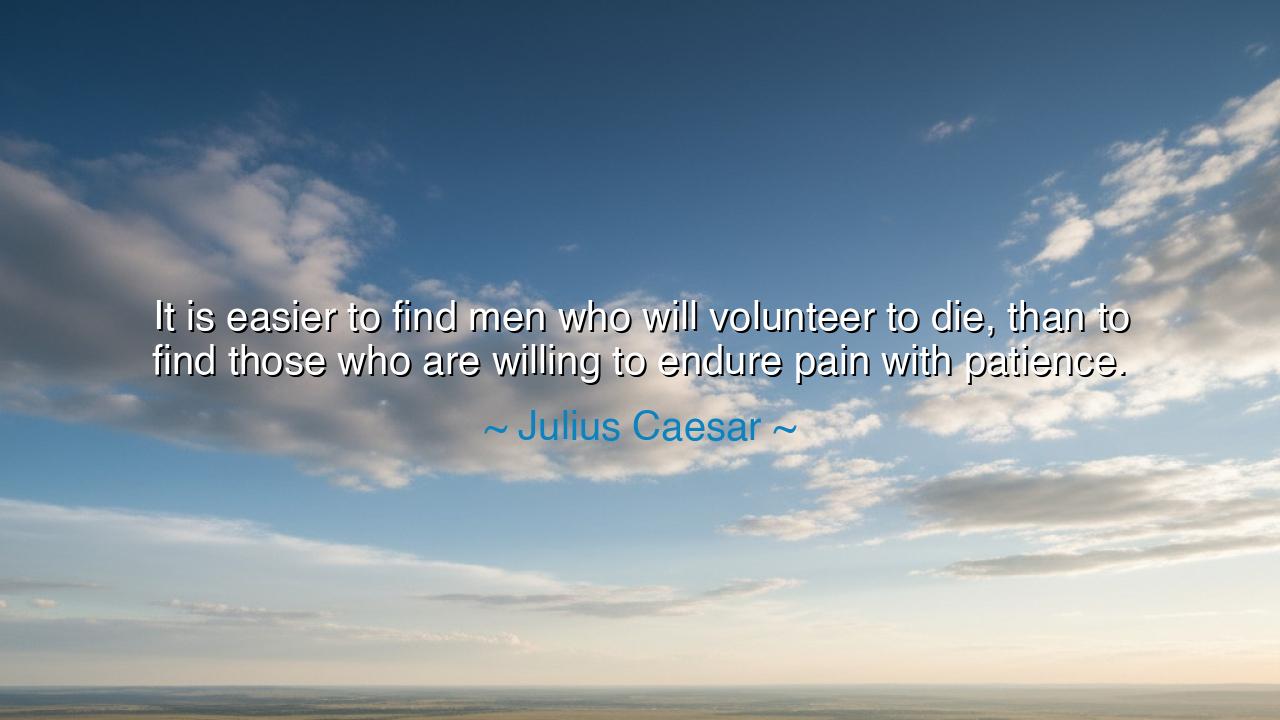
It is easier to find men who will volunteer to die, than to find
It is easier to find men who will volunteer to die, than to find those who are willing to endure pain with patience.






The words of Julius Caesar, the great conqueror of Rome, still echo with timeless weight: “It is easier to find men who will volunteer to die, than to find those who are willing to endure pain with patience.” In these words, Caesar did not speak of the battlefield alone, but of the deeper war waged within the human spirit. For death, sudden and glorious, may be chosen in a moment of fire and honor. But pain, that slow and lingering companion, demands not one instant of courage, but countless hours of endurance. And herein lies the greater trial: patience in suffering, a heroism unseen by the crowds.
Think of the soldier who charges into battle. He may be struck down in an instant, his name remembered for bravery. Yet think also of the wounded man who lingers in the camp, bearing agony for weeks, months, even years. There are no trumpets for his endurance, no laurels for his suffering. Yet his battle is harder, for it is fought not in the open field, but in the secret chambers of the soul. Caesar saw this truth, and in his wisdom, revealed to us that the hardest courage is not to die once, but to endure pain endlessly with dignity.
History abounds with examples. Consider the figure of Job in the scriptures. Stripped of family, wealth, and health, he endured suffering that seemed unbearable. He did not choose a swift end, though it would have been easier. Instead, he bore his agony, questioning, grieving, yet never surrendering. His patience in pain became a greater victory than the mightiest warrior’s sword. And so Job stands as a testament that the truest heroism lies not in the fire of a single moment, but in the long endurance of sorrow.
Or look to the life of Nelson Mandela. For twenty-seven years he languished in prison, robbed of freedom, beaten down by injustice. Many would have chosen death, and indeed some of his comrades did. But Mandela endured with patience, and through that endurance, he emerged not broken, but unshaken, ready to lead his people. His example shows that the courage to face pain with patience may change not only a life, but the course of nations.
The ancients themselves understood this paradox. The Spartans trained their young to withstand hardship in silence, teaching that the greatest strength was not in the swing of the sword, but in the ability to bear hunger, cold, and pain without complaint. Caesar’s words echo this wisdom: to endure is harder than to perish. For the grave asks nothing of us; but life in its trials demands everything.
Thus, O reader, the lesson is plain. Seek not only the bravery of the instant, but also the courage of endurance. Do not envy the warrior who falls with glory in one hour; rather, honor the soul who rises each day to carry unseen burdens. For in every life there are pains—losses, failures, loneliness, sickness—that cannot be escaped. To meet them with patience is the highest form of valor.
Practical action lies within your grasp: when suffering comes, do not flee to despair, nor curse your fate. Instead, breathe, and say, “This too I can bear.” Build the muscle of patience as one builds the body—with daily practice. Whether in small frustrations or great sorrows, train your spirit not to break. And when you see another in pain, do not dismiss their endurance as weakness, but honor it as the hidden strength it is.
Remember Caesar’s teaching: death may be embraced by the bold, but true greatness belongs to those who endure life’s pain with steadfast patience. Be among them. Let your suffering forge you, not destroy you. For in the long endurance lies the highest courage, the most unshakable strength, and the truest victory of the human spirit.






AAdministratorAdministrator
Welcome, honored guests. Please leave a comment, we will respond soon